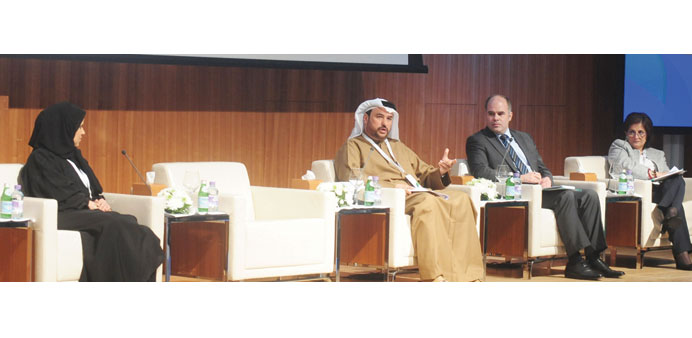By Ayman Adly/Staff Reporter
What happens within the closed circle of the family should not be considered as private issues as long as it reflects on the society in general, a senior official of the Doha International Family Institute (DIFI) said yesterday.
“Some Arab governments could not adequately address issues such as family violence and child marriage because they are considered confidential family matters, while in fact they have their negative impacts on the whole country,” pointed out Noor al-Malki al-Jehani, executive director.
She was addressing a panel discussion on the “Demographic challenges and their impact on the Arab family” at the High Level Policy Dialogue and International Research Seminar on the Impact of Population Dynamics on the Arab Family, organised by DIFI.
The panellists pointed out that the financial, economic and overall social cost of internal family deviations and disputes accumulates over the years and when left unheeded by local government, they result in long run losses that may cost the public budget millions of dollars.
“The cost of family troubles and deviations are calculated in the West and Europe, but the case has not been so in the Arab world,” al-Malki said while observing that the high divorce rate in the GCC countries raises great challenges, yet the current policies and strategies to address them offer only temporary solutions that appease the consequences rather than address the fundamental issues behind the problem.
“We have to urgently review the whole system to devise fundamental solutions,” she urged.
Dr Jamal al-Bah, chairman of the Arab Family Organisation, UAE, pointed out that the Arab family suffers myriad problems due to the widely and swiftly changing surroundings which have shaped the awareness of young generations.
“While occupied in economic development issues, many Arab governments, in the GCC region in particular, have failed to address such dramatic changes. Further, some other governments have ignored completely these family issues.
“The time of big families seems to be over. We now have small nuclear families among other issues that have come up on the surface such as celibacy, delayed age of marriage, and dwindling values of marriage in local society.”
He explained that at least six different expatriates live in the house of a Gulf family such as drivers, maids, gardeners, cooks, and babysitters and they have various impacts on children.
Dr Nadir Qabbani, from Silatech, explained that the Arab world has one of the highest rates of unemployment in the world at 27% while some countries have up to 50%.
“Also, young people in many Arab countries have to wait many years before they get a satisfactory job, eventually delaying marriage and the starting of families.
“Young people should focus on gaining practical and professional experiences while they are looking for a job as they start their careers,” he said, recommending that schools should introduce more practical programmes into the education system and give more focus on career orientation guidance.
Dr Abla Sibai, professor and director at the Centre for Studies on Aging in Lebanon, said that ageing has become a pressing issue worldwide and it has to be addressed so as to positively engage the experiences and expertise of the elderly people in a productive way.
“The elderly can take part as active players in the economy if they are offered flexible working hours, voluntary work and different retirement options.”
Speaking at the opening session, Mohamed Abdelwahid, United Nations Population Fund regional director for Arab States, said that governments are required to adopt strategies and mechanisms to provide protection and support for families in undertaking their tasks in building the society.

The panel discussion in progress at the DIFI event yesterday.
